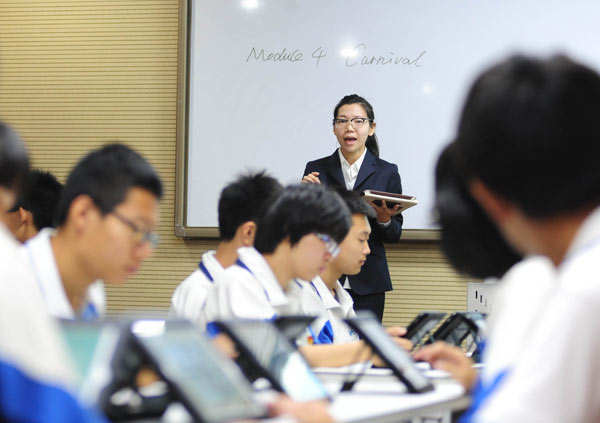 |
|
An English teacher in Tianjin No 14 Middle School gives a lecture in September.Han Yi / Xinhua |
The Ministry of Education has released a draft reform plan for gaokao, the national college entrance examination, which will be open for public opinion soon, making it clear that English will not be included in gaokao in the future.
The plan, which was released by the ministry on Friday, said English will not be a gaokao test subject in the future. Instead, students can take English tests more than once each year, and only the highest score will be counted.
The change has been welcomed by many people.
Tang Shengchang, an expert with the national education and examination steering committee, said the reform will offer students more chances, and exclude accidental factors in examinations.
"A one-time examination usually can't reflect a student's real level, and it's a kind of unfairness to students," he said. "But after several tests, I think, the English level of students can be tested in a more accurate way."
Liu Jiao, an eighth-grader in Xi'an, Shaanxi province, said the reform is good news for students, and she has been looking forward to such a change.
"In the past, we had only one chance, and if something unexpected happened during the test, we did not have a chance to make up for it.
"But now we needn't worry if we don't do well the first time, because we have a second time, a third time and even more times to do better," she said.
The reform will be piloted in some provinces from 2014, and their experience will be summarized and expanded in 2017. By 2020, a new testing and recruiting system will be formed and promoted nationwide, according to the plan.
Liu Limin, vice-minister of the ministry, said the advantage of the new policy is that students can choose when and how often they take the tests according to their own needs.
"That is to say, students do not have to study English extremely hard or spend so much time preparing for the English test before gaokao," he said. "It will be a big relief for students."
As part of efforts to support the reform, the Beijing Municipal Committee of Education is considering reducing the difficulty of the city's English test from 2014.
Options included reducing the vocabulary item from 3,500 words to 3,080 in the gaokao of 2014, and holding two English tests for gaokao from 2016.
However, some still have concerns.
Wang Qingrong, a mother of an eighth-grader in Fuzhou, Fujian province, said such a change means little if universities still enroll students only on the basis of scores.
"In my opinion, if the enrollment system stays the same, such a change in gaokao will make students keep taking English tests until they get a satisfactory score," she said. "Under such circumstances, I'm afraid it will affect the study of other subjects, or add to students' workloads."
Xiong Bingqi, vice-president of the 21st Century Education Research Institute, agreed with Wang.
"The reform of the enrollment system is the core," he said. "To ease people's worries, an enrollment system not only based on examinations should be implemented."
Addressing such concerns, the ministry is looking at options to reform the enrollment system, such as introducing a multievaluation system that doesn't enroll students based only on their test performances.
zhaoxinying@chinadaily.com.cn
|
|
|
|
|
|
|
|
